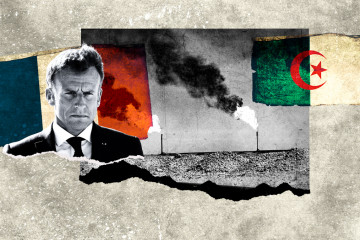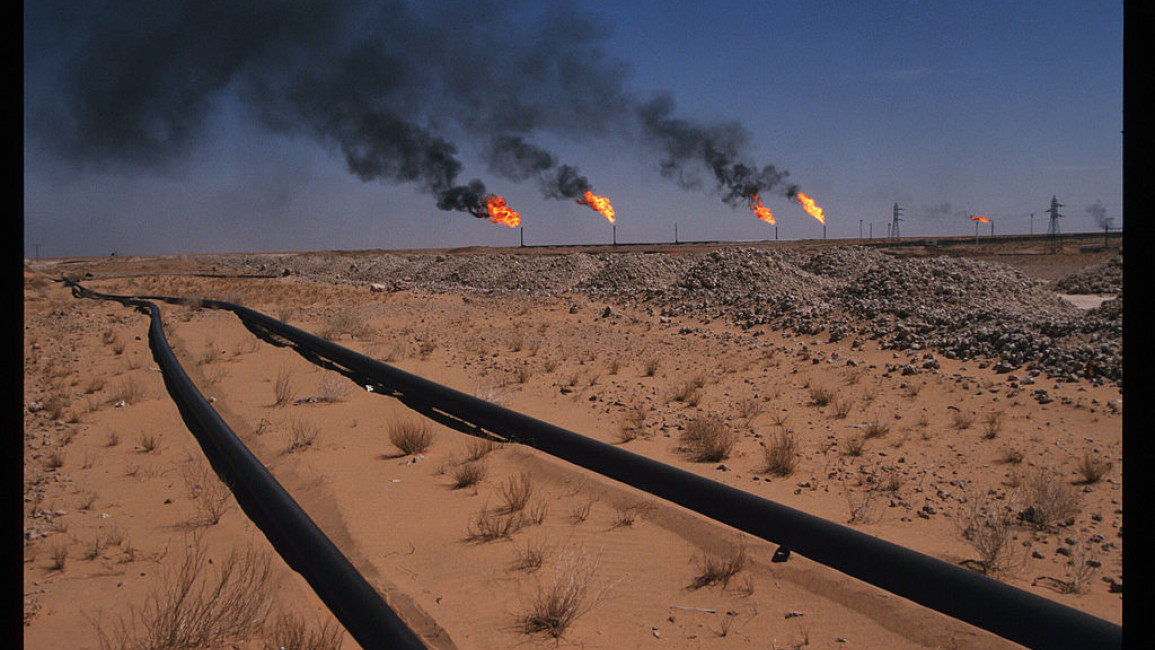
The growing competition for energy alliances with Algeria

Arriving in Algiers for his second official visit in late August, French President Emmanuel Macron shook hands with his Algerian counterpart Abdelmadjid Tebboune with the objective of mending the delicate ties that bind the two nations together.
"We have a complex, painful common past and it has at times prevented us from looking at the future," Macron said standing alongside Tebboune.
For Algiers, the objective of the three-day visit was to “open up new perspectives for partnership and cooperation with France".
Things turned sour between the two in 2021 after comments made by Macron in which he suggested Algerian national identity did not exist before French rule and accused Algeria's leaders of rewriting the history of the independence struggle based on a hatred of France.
"Algeria, the EU's third-largest gas supplier, is looking to capitalise on the energy crisis by locking in more European investment for its future revenue safety net"
The comments unsurprisingly provoked a storm in Algeria, where the ruling elite is still dominated by the generation that fought for independence from France after 132 years of colonial rule and where that struggle continues to shape national identity.
In reaction, Algeria withdrew its ambassador for consultations and closed its airspace to French planes, complicating the French military mission in the Sahel.
Tensions were then further exacerbated when France decided to slash the number of visas issued in North Africa because governments in the Maghreb had refused to take back migrants expelled from France.
The conclusion of August’s visit, which Tebboune hailed as “excellent and very successful”, came with a raft of accords that the Élysée hopes will smooth ties with the North African nation, a major gas and oil supplier to Europe and a key regional military player.
While the nations agreed to cooperate on gas and hydrogen development and medical research, ease visa restrictions, and create a joint commission to examine archives from the colonial period, an official apology for France’s historic crimes in Algeria shows no sign of materialising any time soon.
A change in tone
Due to the Russian-Ukraine war and the steady rise in illegal migration across the Mediterranean, Algeria and its gas have taken on greater importance for Europe while it navigates its worsening energy crisis.
The timing has proven opportune for Algeria, the EU’s third-largest gas supplier, which is looking to capitalise on the crises by locking in more European investment for its future revenue safety net having already increased its gas supplies to the continent mainly via its pipelines to Italy and Spain.
In July this year, Algerian group Sonatrach signed a $4 billion gas deal with US group Occidental Petroleum, Italian company Eni, and French giant Total for the Berkine field in the country's southeast.
Last month, meanwhile, Sonotrach made a new oil discovery in the Adrar province with an estimated volume of 151 million barrels which could offset concerns that Algeria lacks the means to meet Europe’s increased gas demands.
|
|
But despite Italy and Spain being more reliant on Algeria for gas compared to France, things have not been plain sailing for old acquaintances over the last few months.
After Spain relented on its traditional neutral position on the Western Sahara issue by backing Rabat, Algiers proceeded to suspend the Treaty of Friendship in place since 2002 and block trade with Spain.
The crisis couldn't have come at a worse time for Spain owing to the region’s gas crisis and Sonatrach’s decision thereafter to revise the prices of its long-term contracts with the Spaniards.
"From the United States to Russia, there are several Western chairs at the Algerian negotiating table, and each wants their voice to ring loudest"
The economic repercussions of the crisis earned Spanish Prime Minister Pedro Sanchez and his government strong internal criticism and in June a parliamentary motion was voted on by the political class urging the government to return to a position of neutrality in the Sahrawi dossier and to restore normal relations with Algeria.
Despite the soured relations, which Spain is looking to mend, Algeria has stated that it will respect its contractual obligations with Spain, having once been its leading gas supplier.
But it has since then given priority to Italy for increased gas production thanks to the productive visits of Italian officials in recent months.
Competing for dominance at the table
From the United States to Russia, there are several Western chairs at the Algerian negotiating table, and each wants their voice to ring loudest.
Macron and his 90-person entourage, which included the French finance minister, interior minister, and CEO of the French utility company Engie, had a productive visit for the most part, arguably arousing as much hope moving forward as that of Jacques Chirac’s visit in 2003.
However, smiling photo ops and carefully chosen language can only go so far regarding long-term commitments and navigating the same sensitivities that have often provoked a breakdown of relations when mishandled.
It was only a few months after Chirac’s visit that France adopted a law glorifying colonisation, rendering Chirac’s efforts at reconciliation as the first state visit by a French president since independence insincere.
|
|
Tebboune and Macron have pledged that the process of consolidating their bilateral relationship will be "irreversible", but the signing of the Algiers Declaration to conclude the presidential visit can only inspire hope rather than action for now when it comes to aspects such as political dialogue, history, memory, and, above all, the contentious issue of accountability.
France also has to contend with Algeria’s seasoned partnerships with countries like Russia and China and increasingly Turkey, which was on the receiving end of accusations from Macron that it is pushing an influential, neo-colonial, and imperialist agenda that paints France as the “enemy” by using France’s colonial past in Algeria to “manipulate” history for its gain.
Ankara blasted Macron’s comments as “unacceptable” and will most likely make some reference to it when President Recep Tayyip Erdogan visits Algeria in due course following a closed-door meeting with Algerian Prime Minister Ayman Ben Abderrahmane last month in which the Libyan conflict, the energy file, and additional Turkish economic interests in Algeria would have been raised.
"For now, Algeria will continue to host heads of state and hone in on its bilateral relations by filtering out those who are useful in the background as allies from those with political capital it can actively engage with"
France knows its influence in the region has been waning. Paris would have duly noted Algeria’s public choice of English instead of French during Macron’s trip as the latest signal the government wants to phase out French as one of its main languages of officialdom and open up the country to more opportunities with the Anglophone world.
With the previously cancelled visit from Saudi Crown Prince Mohammed bin Salman reportedly on the cards again and the Arab League convening in the capital at the end of the year, Algeria is navigating the international arena with a sense of urgency in ensuring it remains a key regional player with its current services recognised and its potential entertained, particularly when it comes to neighbouring Libya and the turbulent Sahel.
A cosier relationship with the EU and the US would be in the latter’s interest as they seek to better offset the consequences of Algeria’s ever-strengthening ties with Moscow, with both parties agreeing to joint military exercises in November, and Algiers’ close economic partnership with Beijing, which also includes defence contracts.
For now, Algeria will continue to host heads of state and hone in on its bilateral relations by filtering out those who are useful in the background as allies from those with political capital it can actively engage with in furthering its diplomatic and economic ambitions.
Those desiring greater allegiance with Algiers for its stable energy production need to treat the country as its own entity that is not simply a convenient alternative to Morocco when Rabat cannot meet the West’s demands, qualities that if played right by both parties can further the national interests for all involved.
Yasmina Allouche is a freelance journalist and researcher working on the Maghreb with a special focus on Algeria.
Follow her on Twitter: @animsche



![President Pezeshkian has denounced Israel's attacks on Lebanon [Getty]](/sites/default/files/styles/image_684x385/public/2173482924.jpeg?h=a5f2f23a&itok=q3evVtko)



 Follow the Middle East's top stories in English at The New Arab on Google News
Follow the Middle East's top stories in English at The New Arab on Google News


